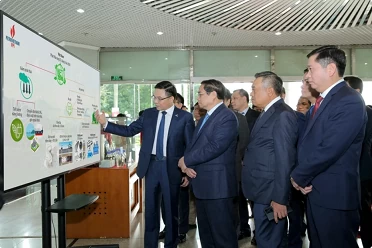
Sci-tech application, digital transformation – key to sustainable development of Petrovietnam
Latest
 |
| A leader of Petrovietnam reports the Vietnam Petroleum Institute’s research on CO2 capture and storage to Prime Minister Pham Minh Chinh. (Source: VNA) |
In the new context, the industry is facing substantial difficulties and challenges that require stronger sci-tech research and application, and digital transformation.
Among those challenges, the oil and gas output has been declining since it is now harder to discover new fields, exploration and exploitation costs are rising, especially in deep-water areas, and the exploited volume at traditional fields tends to decrease.
The global fuel market is developing complicatedly and unpredictably due to impacts of multiple factors like economic, political, and geopolitical changes. Fluctuations of oil and gas prices have directly affected production and business efficiency.
Amid climate change, environmental pollution, and the depletion of natural resources, it’s now an urgent need for the sector to switch to green and sustainable development, strongly invest in renewable energy, reduce greenhouse gas emissions, and protect the environment.
Meanwhile, the Fourth Industrial Revolution creates opportunities for applying digital technology, artificial intelligence (AI), and Internet of Things (IoT) to help the industry optimise activities, improve production and business efficiency, cut expenses, and boost labour productivity. However, the application of digital technology to management, production, and business activities of the sector and Petrovietnam remains limited and incomprehensive.
In addition, compared to oil and gas enterprises in the region and the world, the sector and Petrovietnam still lack core and breakthrough technologies. They have yet to conduct many large and long-term researches or industrial-scale trial production programmes to develop copyrighted products and technologies.
The Vietnam Petroleum Institute has built digital copies for oil and gas fields to conduct real-time monitoring, make quick and precise decisions, and improve management and exploitation efficiency.
To overcome challenges and seize opportunities in the new context, the sector and Petrovietnam are advised to focus on several solutions.
In terms of institutional perfection, it is necessary to propose competent agencies build a comprehensive and transparent legal framework, especially for technology research and transfer, intellectual property protection, and innovation facilitation in the oil and gas industry. They should propose authorities issue special tax, credit, and land incentives for hi-tech application and digital transformation projects to attract investment. They also need to devise a mechanism for encouraging oil and gas companies to invest in research and development, and cooperate with institutes, universities, and startups to promote the work.
The sector and Petrovietnam should prioritise investment in core technologies, focusing resources on researching, developing, and mastering core and breakthrough technologies for different areas, including exploration, exploitation, production, transport, and distribution of oil and gas, along with promoting renewable energy like wind power, solar power, and green hydrogen.
Besides, it is important to step up transferring and applying technologies from developed countries, and to cooperate with the world’s leading businesses to access cutting-edge technologies.
With regard to digital transformation, they are advised to design and develop a comprehensive digital transformation strategy for the entire oil and gas sector; apply digital technology to management, production, business activities, and supply chains; and develop infrastructure of information technology, big data, cyber-security, and cloud computing to ensure effective transformation. They should also assist enterprises to carry out digital transformation projects and adopt new technological solutions.
On April 24, 2024, the Politburo issued Conclusion No. 76-KL/TW, which targets fast, sustainable, comprehensive, and effective development for the oil and gas industry, and that Petrovietnam will become a national industry - energy group that is connected with the development of traditional energy areas and takes part in new energy and renewable energy value chains.

















